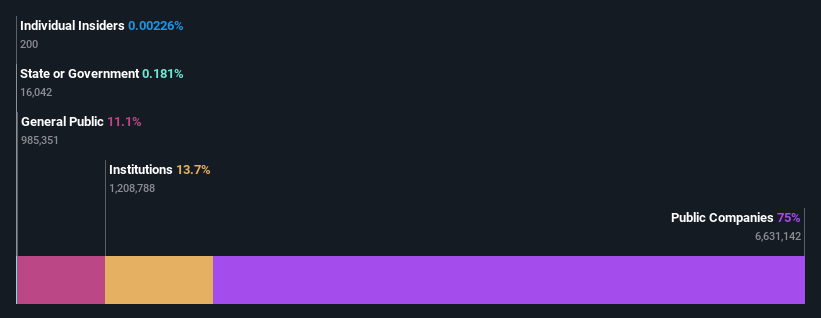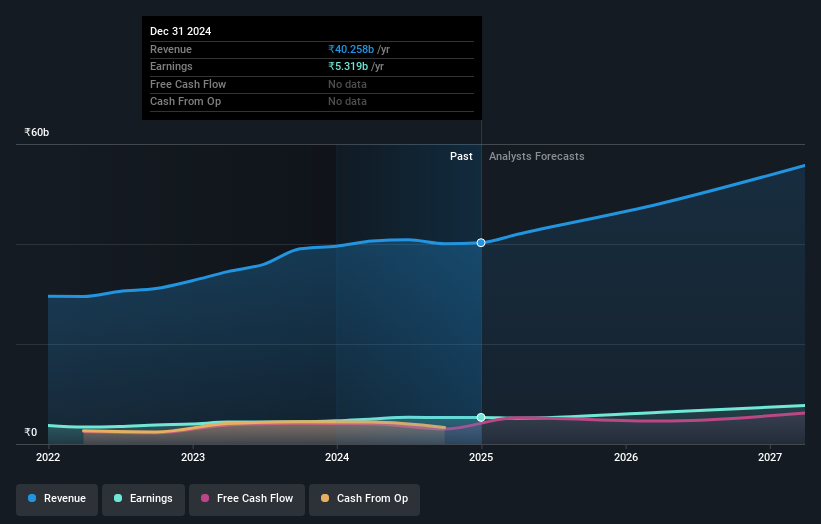- India
- /
- Electronic Equipment and Components
- /
- NSEI:HONAUT
Honeywell Automation India Limited's (NSE:HONAUT) top owners are public companies with 75% stake, while 14% is held by institutions

Key Insights
- The considerable ownership by public companies in Honeywell Automation India indicates that they collectively have a greater say in management and business strategy
- 75% of the company is held by a single shareholder (Honeywell International Inc.)
- Institutional ownership in Honeywell Automation India is 14%
A look at the shareholders of Honeywell Automation India Limited (NSE:HONAUT) can tell us which group is most powerful. The group holding the most number of shares in the company, around 75% to be precise, is public companies. In other words, the group stands to gain the most (or lose the most) from their investment into the company.
Meanwhile, institutions make up 14% of the company’s shareholders. Institutions often own shares in more established companies, while it's not unusual to see insiders own a fair bit of smaller companies.
Let's delve deeper into each type of owner of Honeywell Automation India, beginning with the chart below.
Check out our latest analysis for Honeywell Automation India

What Does The Institutional Ownership Tell Us About Honeywell Automation India?
Many institutions measure their performance against an index that approximates the local market. So they usually pay more attention to companies that are included in major indices.
Honeywell Automation India already has institutions on the share registry. Indeed, they own a respectable stake in the company. This implies the analysts working for those institutions have looked at the stock and they like it. But just like anyone else, they could be wrong. If multiple institutions change their view on a stock at the same time, you could see the share price drop fast. It's therefore worth looking at Honeywell Automation India's earnings history below. Of course, the future is what really matters.

Honeywell Automation India is not owned by hedge funds. Honeywell International Inc. is currently the company's largest shareholder with 75% of shares outstanding. This implies that they have majority interest control of the future of the company. With 3.7% and 2.3% of the shares outstanding respectively, SBI Funds Management Limited and Nippon Life India Asset Management Limited are the second and third largest shareholders.
Researching institutional ownership is a good way to gauge and filter a stock's expected performance. The same can be achieved by studying analyst sentiments. There are plenty of analysts covering the stock, so it might be worth seeing what they are forecasting, too.
Insider Ownership Of Honeywell Automation India
The definition of company insiders can be subjective and does vary between jurisdictions. Our data reflects individual insiders, capturing board members at the very least. Management ultimately answers to the board. However, it is not uncommon for managers to be executive board members, especially if they are a founder or the CEO.
I generally consider insider ownership to be a good thing. However, on some occasions it makes it more difficult for other shareholders to hold the board accountable for decisions.
Our information suggests that Honeywell Automation India Limited insiders own under 1% of the company. It's a big company, so even a small proportional interest can create alignment between the board and shareholders. In this case insiders own ₹7.2m worth of shares. It is good to see board members owning shares, but it might be worth checking if those insiders have been buying.
General Public Ownership
The general public, who are usually individual investors, hold a 11% stake in Honeywell Automation India. While this size of ownership may not be enough to sway a policy decision in their favour, they can still make a collective impact on company policies.
Public Company Ownership
We can see that public companies hold 75% of the Honeywell Automation India shares on issue. This may be a strategic interest and the two companies may have related business interests. It could be that they have de-merged. This holding is probably worth investigating further.
Next Steps:
I find it very interesting to look at who exactly owns a company. But to truly gain insight, we need to consider other information, too.
I like to dive deeper into how a company has performed in the past. You can access this interactive graph of past earnings, revenue and cash flow, for free.
If you would prefer discover what analysts are predicting in terms of future growth, do not miss this free report on analyst forecasts.
NB: Figures in this article are calculated using data from the last twelve months, which refer to the 12-month period ending on the last date of the month the financial statement is dated. This may not be consistent with full year annual report figures.
Valuation is complex, but we're here to simplify it.
Discover if Honeywell Automation India might be undervalued or overvalued with our detailed analysis, featuring fair value estimates, potential risks, dividends, insider trades, and its financial condition.
Access Free AnalysisHave feedback on this article? Concerned about the content? Get in touch with us directly. Alternatively, email editorial-team (at) simplywallst.com.
This article by Simply Wall St is general in nature. We provide commentary based on historical data and analyst forecasts only using an unbiased methodology and our articles are not intended to be financial advice. It does not constitute a recommendation to buy or sell any stock, and does not take account of your objectives, or your financial situation. We aim to bring you long-term focused analysis driven by fundamental data. Note that our analysis may not factor in the latest price-sensitive company announcements or qualitative material. Simply Wall St has no position in any stocks mentioned.
About NSEI:HONAUT
Honeywell Automation India
Manufactures and sells industrial process control and automation systems in India and internationally.
Flawless balance sheet with proven track record and pays a dividend.
Similar Companies
Market Insights
Community Narratives





